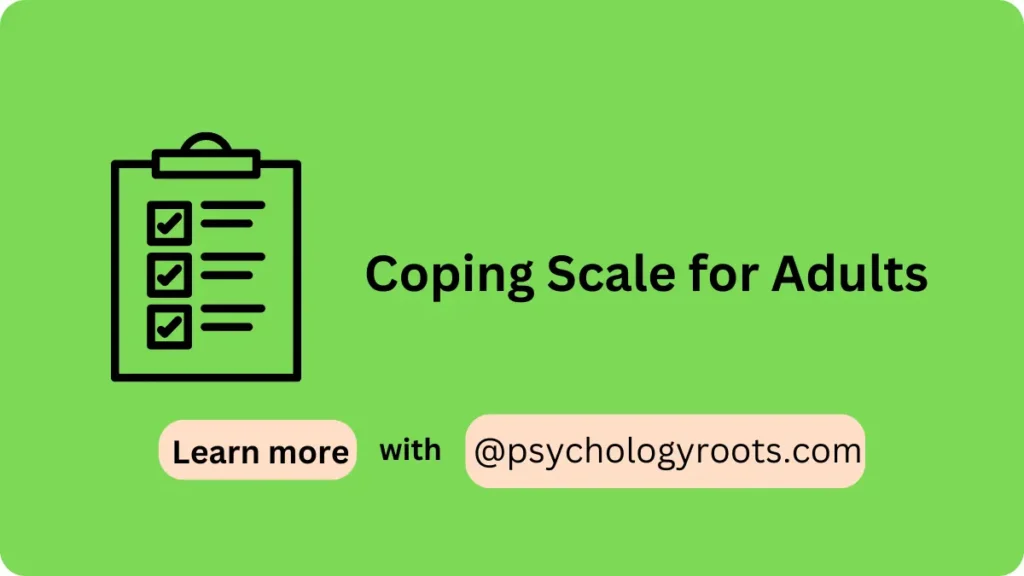Table of Contents
Coping Scale for Adults
Here in this post, we are sharing the “Coping Scale for Adults”. You can read psychometric and Author information. We have thousands of Scales and questionnaires in our collection (See Scales and Questionnaires). You can demand us any scale and questionnaires related to psychology through our community, and we will provide you with a short time. Keep visiting Psychology Roots.
About Coping Scale for Adults
Scale Name
Coping Scale for Adults
Author Details
Erica Frydenberg and Ramon Lewis
Translation Availability
Not Sure

Background/Description
The Coping Scale for Adults (CSA) is a psychometric tool designed to assess the coping strategies employed by adults when faced with stress and adversity. Developed by Erica Frydenberg and Ramon Lewis, and published by the Australian Council for Educational Research in 2016, the CSA builds on earlier work by Frydenberg in developing coping scales for children and adolescents. The CSA is tailored specifically to the unique challenges and stressors encountered in adult life, making it a valuable resource for both clinical and research settings.
The scale measures a broad range of coping strategies, categorized into different domains, such as problem-solving, seeking social support, and emotional regulation. It also identifies less adaptive coping mechanisms like avoidance and denial. By understanding these coping strategies, mental health professionals can better support individuals in developing more effective ways of managing stress and enhancing their psychological resilience.
The CSA is used to assess coping in various contexts, including workplace stress, personal relationships, health-related stress, and other life challenges. It can be applied in individual therapy, group interventions, or as part of broader psychological research.
Administration, Scoring and Interpretation
- Participant Selection: The CSA is suitable for use with adults across a wide age range, particularly those experiencing stress in different areas of their lives. It can be administered in both clinical and non-clinical settings.
- Questionnaire Distribution: The scale is typically administered as a self-report questionnaire. Participants are provided with a series of statements that reflect various coping behaviors and attitudes toward stress.
- Response Format: Participants rate their responses on a Likert scale, usually from 1 (does not apply) to 5 (applies very much), indicating how often they use specific coping strategies.
- Scoring: The CSA includes multiple subscales that correspond to different types of coping strategies. Scores are calculated for each subscale, allowing for the identification of predominant coping styles, such as problem-focused coping or emotion-focused coping.
Reliability and Validity
The Coping Scale for Adults has been rigorously tested and has demonstrated strong psychometric properties. It shows high reliability, with consistent results across different populations and contexts. The scale’s validity is supported by its ability to accurately measure a wide range of coping strategies and its correlation with other established measures of psychological well-being and stress management.
Available Versions
60-Items
Reference
Fredenberg, E., & Lewis, R. (2000). The Coping Scale for Adults: Construct Validity and What the Instrument Tells Us.
Frydenberg, E., & Frydenberg, E. (2017). The measurement of coping. Coping and the Challenge of Resilience, 47-66.
Important Link
Scale File:
Frequently Asked Questions
Q: What is the Coping Scale for Adults (CSA)?
A: The CSA is a psychometric tool designed to assess the coping strategies used by adults in response to stress and adversity.
Q: Who developed the CSA?
A: The CSA-2 was developed by Erica Frydenberg and Ramon Lewis and published by the Australian Council for Educational Research in 2016.
Q: How is the CSA administered?
A: The CSA is administered as a self-report questionnaire, where participants rate their use of various coping strategies on a Likert scale.
Disclaimer
Please note that Psychology Roots does not have the right to grant permission for the use of any psychological scales or assessments listed on its website. To use any scale or assessment, you must obtain permission directly from the author or translator of the tool. Psychology Roots provides information about various tools and their administration procedures, but it is your responsibility to obtain proper permissions before using any scale or assessment. If you need further information about an author’s contact details, please submit a query to the Psychology Roots team.
Help Us Improve This Article
Have you discovered an inaccuracy? We put out great effort to give accurate and scientifically trustworthy information to our readers. Please notify us if you discover any typographical or grammatical errors.
Make a comment. We acknowledge and appreciate your efforts.
Share With Us
If you have any scale or any material related to psychology kindly share it with us at psychologyroots@gmail.com. We help others on behalf of you.